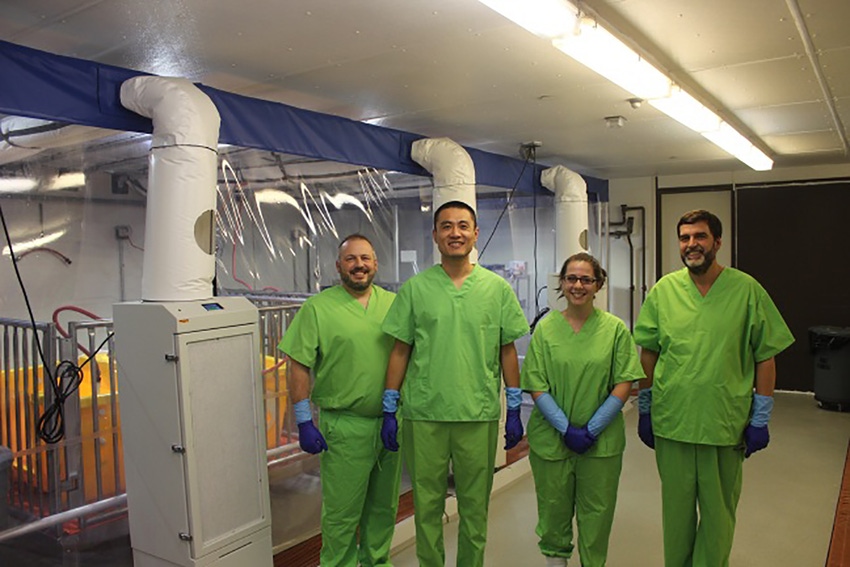ISU scientists receive grant to advance human immune model in pigs
Research could pave the way to new treatments for a wide range of health problems, from cancer to severe burns.
May 29, 2020

The strict regulations that govern medical research with human subjects often slow down the study of the human immune system. So generations of researchers have used models of various designs to simulate human systems. Scientists at Iowa State University are poised to take a significant step forward in this arena by transferring a human immune system into pigs.
The research will allow biomedical researchers to study realistic human cellular and tissue responses in a wide range of applications without the use of human subjects. The project recently received a nearly $3 million grant from the National Institutes of Health to develop the technology over the next four years. The research could pave the way to new treatments for a wide range of health problems, from cancer to severe burns, says Christopher Tuggle, a professor of animal science and member of the research team.
"These pigs are a very good model because the genetics and physiology of pigs are very similar to humans," Tuggle says. "What's unique about them is they don't have a big part of their immune system that allows them to reject cells from other species. The advantage of that is that they can serve as a biomedical model for human cell growth or human cell biology."
The pigs are born with severe combined immune deficiency. The research team breeds the pigs from a genetic line from the ISU herd to have virtually no immune systems of their own. That means the researchers must go to great lengths to raise the pigs in a specialized biocontainment facility to prevent disease exposure. Close collaboration between Tuggle and his group with ISU's Laboratory Animal Resources staff has made these unique "pig bubbles" a reality.
The pigs provide highly realistic models for studying how to make human cells respond to skin grafts and ways to treat a range of cancers. The researchers also will study regenerative medicine in the pigs, or the possibility of repairing damaged tissues with a patient's own cells, rather than replacing them. An important question in this field is the safety of such human stem cell derivatives, which could revert to cancer-like, fast-growing stem cells from which they were created. To that end, the research team will use the SCID pig to test the safety of such cells, provided by collaborators at the Mayo Clinic.
"The idea is to create something that you can give back to the patient to help them repair whatever damage they have," Tuggle says. "If it comes from your own body, there's less chance of immune rejection. Our work can help show such cellular therapies are safe in an animal model."
Jason Ross, Lloyd Anderson Endowed professor in Physiology and director of the Iowa Pork Industry Center, has created cloned pigs from genetically modified cell lines to further suppress the immune system development of the pigs. Ross says he and his colleagues will produce SCID pigs as needed for the research, which likely will not require more than 10 pigs at any given time.
Ross said the project will generate new opportunities to explore intriguing biological questions beyond those immediately relevant to human health.
"This model is going to give us a better understanding of immune cell differentiation in the pig, for instance," he says. "There's a lot of basic science value in that regard."
Daniel Thomson, chair in animal science, says he expects the research will spark collaborations with scientists across the globe.
"Iowa State University is an international leader in animal genetics, physiology and health," Thomson says. "This research by Dr. Tuggle, Dr. Jack Dekkers and Dr. Ross will lead to human lifesaving discoveries utilizing the SCID pig model. We are excited about the future partnerships that will develop with collaborators around the world with our department and university."
In addition to the National Institutes of Health, the SCID pigs research has received support from the ISU Vice President for Research's office and the ISU College of Agriculture and Life Sciences.
Source: Iowa State University, which is solely responsible for the information provided, and wholly owns the information. Informa Business Media and all its subsidiaries are not responsible for any of the content contained in this information asset.
You May Also Like


